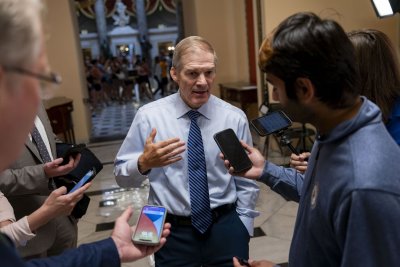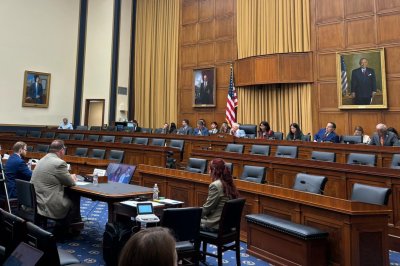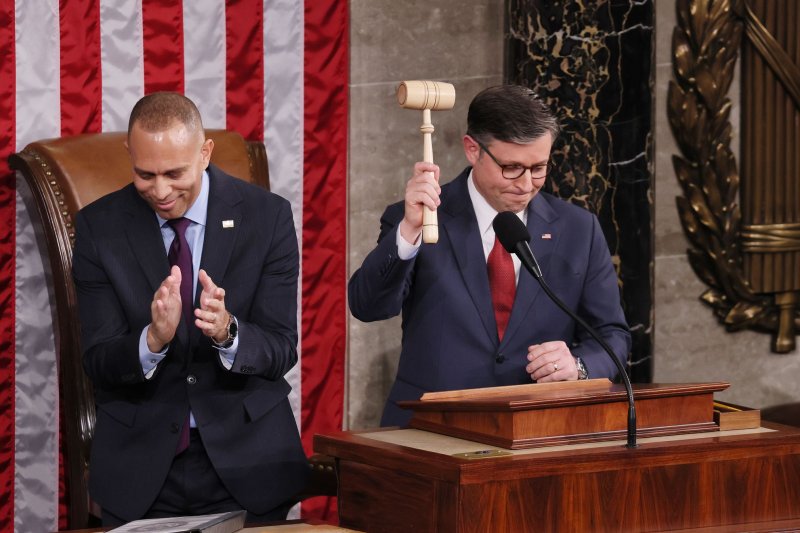1 of 3 | The House Judiciary Subcommittee on Oversight heard testimony Tuesday from four witnesses who argued that left-wing organizations have exploited federal tax dollars to advance their radical causes. Photo by Bridget Erin Craig/UPI
WASHINGTON, July 15 (UPIU) — Republican lawmakers alleged Tuesday that Democratic leaders have funneled hundreds of millions in taxpayer dollars to nonprofit organizations run by political allies, advancing what they called a “radical agenda” without public accountability.
Democrats fired back, calling the hearing a partisan distraction aimed at vilifying groups that serve vulnerable communities.
The House Judiciary Subcommittee on Oversight’s hearing, titled “How Leftist Nonprofit Networks Exploit Federal Tax Dollars to Advance a Radical Agenda,” drew sharp partisan lines.
The subcommittee chair, Chair Rep. Jefferson Van Drew, R-N.J., said nonprofits that receive federal funds through agencies like USAID and the Justice Department are enacting policies Americans haven’t voted for, accusing Democratic leaders of “abuse of power.”
Rep. Jasmine Crockett, D-Texas, passionately disagreed, arguing the hearing was designed to advance President Donald Trump‘s political agenda, while ignoring pressing civil rights and public safety issues.
“This committee is spending its time holding a hearing with a title that sounds like it was ripped from a conspiracy law,” Crockett said.
Rep. Jim Jordan, R-Ohio, echoed the committee chair’s concerns, calling several taxpayer-funded initiatives under the Biden administration “stupid,” including spending on public broadcasting, diversity, equity and inclusion programs, and federal education grants.
Democrats, however, argued that the hearing lacked substance and accountability. Rep. Jamie Raskin, D-Md., criticized the proceeding as a “waste of time,” as it focused on grievances rather than governance, and that the committee did not call a single official from any of the groups allegedly advancing a radical agenda.
“If our motto is going to be finger-pointing for losers, then this hearing is for losers,” Raskin said.
Hen added that Republicans have been failing to address systemic challenges like gun violence and climate change, and that none of the groups mentioned has been involved in illegal actions, but instead the Republicans simply do not like what certain groups are doing.
For example, Raskin cited the mass firings of Justice Department attorneys who prosecuted Americans for their involvement in the Jan. 6, 2021, attack on the U.S. Capitol.
“Due process is what separates our freedoms from arbitrary state power,” he said.
As the hearing continued, Raskin was the first to bring the Jeffrey Epstein files into the conversation, questioning the Trump administration’s sudden lack of commitment to transparency by not releasing the information.
“Remember that they said this would be the most transparent administration in the United States,” he said.
Witnesses invited by Republican lawmakers argued that taxpayer dollars are being funneled into politically motivated organizations that push divisive agendas.
Tyler O’Neil, senior editor at The Daily Signal, singled out a $2 million grant to the nonprofit Vera Institute of Justice for immigration-related services, calling it part of a broader “immigration industrial complex.”
O’Neill also criticized federal support for the ACLU and the AFL-CIO, arguing that union dues from federal employees were indirectly subsidizing left-leaning political causes.
Insha Rahman, vice president of advocacy and partnerships at the Vera Institute, told UPI, “Today’s congressional hearing was a distraction from the honest debate the American public deserves about the solutions that work to prevent crime, respond to crisis, and stop violence.
“The Department of Justice’s abrupt and illegal terminations of $820 million in grant funding to hundreds of organizations, including Vera, jeopardizes programs and services across the country — including in suburban and rural jurisdictions — that save lives and make communities safer.”
Scott Walter, president of the Capital Research Center, attempted to redirect the conversation. He said that while he personally supports conservative organizations, like the Heritage Foundation, he would oppose federal funding for any ideologically driven group — including those with whom he agrees.
He argued that taxpayer dollars should only go to feeding the hungry and clothing the poor — actions he associated as biblically related good doings — but not socially controversial issues.
Mike Gonzalez, a senior fellow at the Heritage Foundation and contributor to the conservative blueprint Project 2025, testified in a personal capacity and criticized USAID’s funding decisions under Ambassador Samantha Power, suggesting it began the pathway for the agency to prioritize progressive global initiatives over national interest.
Rep. Hank Johnson, D-Ga., and Gonzalez got into an escalated exchange when Gonzalez confronted Democrats about so-called “dark money” — where the source is not disclosed to the public — for groups tied to liberal causes.
Johnson fired back, pointing to the Heritage Foundation’s own opaque funding sources and ties to conservative megadonors like billionaire Charles Koch.
A last minute addition to the witness list was Luis CdeBaca, a former U.S. ambassador and anti-trafficking expert. CdeBaca defended the work of civil society organizations, arguing that they provide critical services to vulnerable populations — often filling gaps left by under-resourced government programs.
He warned against politicizing federal grantmaking, which he said should be based on impact, not ideology.
Rahman reacted similarly to Vera’s work, defending that “The DOJ grants Vera received supported our evidence-based work with correctional staff across the country to improve prison operations, training, and culture for both officers and people incarcerated; expand access to counseling and treatment for people in mental health crisis; and support police and law enforcement to better serve deaf survivors of domestic violence.”



